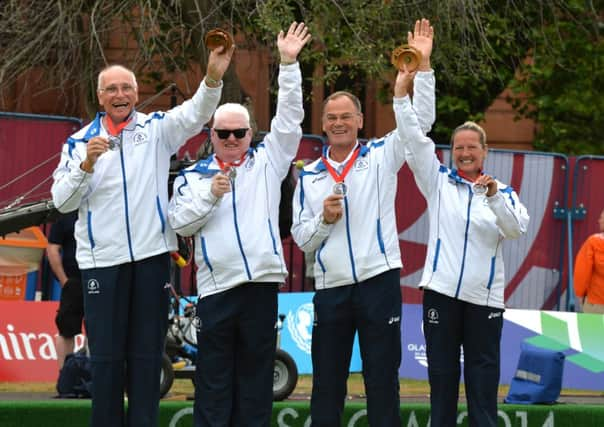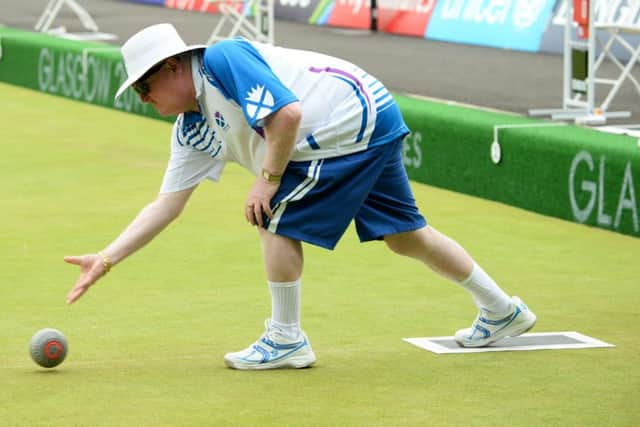Commonwealth Games: Silver for blind bowlers


The decision to run para-sports in tandem with all other events at Glasgow 2014 brought Conway and Edgar’s efforts to a new audience in Scotland. Or as the 57-year-old skip from Scotstoun succinctly put it: “A lot of people had never heard of visually-impaired bowls before the Commonwealth Games and then they see us playing on the green next to Paul Foster and Alex Marshall. For me, that was the biggest thrill ever, to be honest, because they’re wonderful players.”
Advertisement
Hide AdAdvertisement
Hide AdFoster and Marshall are leading lights of Scottish bowls, and have been heavily tipped to take gold in the men’s pairs.


Conway is honest enough to admit that he felt his team – four strong including directors David Thomas and Ron McArthur, who act as guides for judging the line that bowls should be sent down – should have given the lead with the first gold to be decided at Kelvingrove Park.
Yet, any criticism of his own performance was in no way a slight on the South African victors and there could be no argument that they were worthy winners.
For 56-year-old Edgar, earning silver engendered a “fantastic” feeling and made the “amazing” experience the pinnacle of a career that has brought her gold in the world championships.
Conway demurred on where it ranked in his time playing bowls.
“To be honest, winning gold at the world championship in South Africa in 2011 was better – beating the same people,” Conway confessed. “But I said in April that a medal of any colour would be great. As the time went on and we won more matches and we got stronger, I thought it was going to be the top one, but it wasn’t to be. I’m still delighted though.”
And grateful, with the support given to the four-strong team humbling Conway. “I have to thank Bowls Scotland, Disability Scotland, David Gourlay, and so many people who have helped us. It’s meant so much having David [former world bowls champion] as the coach.”
Conway is rated as B3 in the one-to-four rankings for degree of impairment, with one being registered blind. His wife Ada, who retired this year after a glittering bowls career, is B1. The condition is hereditary so he says he has “never known anything better”.
Advertisement
Hide AdAdvertisement
Hide AdHis bowling partner Edgar had a different life experience. “My condition is hereditary. I had good eyesight up until I was nine then it went. My sister was born with this condition and I have three other sisters who have perfect eyesight.”
Any challenges her eyesight might have presented did not stop her taking up bowls 18 years ago, seven years after Conway. Her husband Billy is the current president of the Scottish Association of Blind Bowlers, and SABB members, many of them around the rink for today’s final, will reflect with pride on the service that their silver medallists have performed for their association.
Scotland’s men’s pair of Paul Foster and Alex Marshall will put their favourites status on the line in a semi-final against England tomorrow after an enthralling evening session at Kelvingrove.
They will be joined at the last four stage by the women’s four, skipped by Margaret Letham, but Scottish interest in the women’s singles came to an end when Caroline Brown lost an enthralling, nip-and-tuck quarter-final encounter against England’s Natalie Melmore 21-20.
Foster and Marshall had few problems disposing of their New Zealand opponents 25-8 and will be expected to prove too strong for England’s Sam Tolchard and Andrew Knapper.
Scotland’s women’s fours, having earlier shown their mettle to see off Australia in a win-or-bust contest, were required to dig deep again after finding themselves behind against Jersey with five ends to play. They did so to run out 16-14 victors and earn a semi-final against South Africa, who were rewarded for staging a tremendous fightback to defeat England 12-10.
Scotland men’s triples bowed out yesterday, losing to Northern Ireland 19-12 in the quarter-finals.